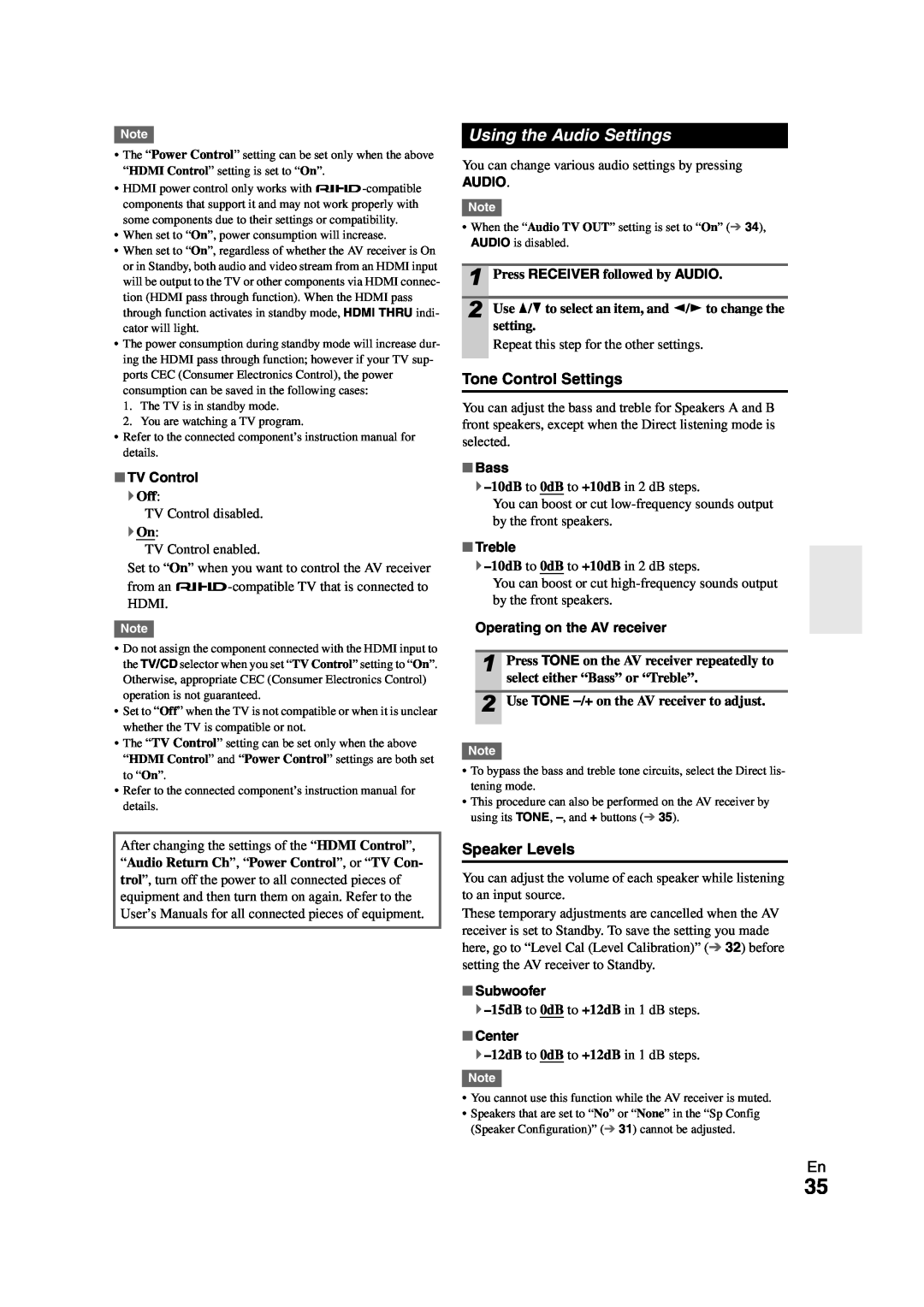
Note
•The “Power Control” setting can be set only when the above “HDMI Control” setting is set to “On”.
•HDMI power control only works with
•When set to “On”, power consumption will increase.
•When set to “On”, regardless of whether the AV receiver is On or in Standby, both audio and video stream from an HDMI input will be output to the TV or other components via HDMI connec- tion (HDMI pass through function). When the HDMI pass through function activates in standby mode, HDMI THRU indi- cator will light.
•The power consumption during standby mode will increase dur- ing the HDMI pass through function; however if your TV sup- ports CEC (Consumer Electronics Control), the power consumption can be saved in the following cases:
1.The TV is in standby mode.
2.You are watching a TV program.
•Refer to the connected component’s instruction manual for details.
■TV Control
`Off:
TV Control disabled.
`On:
TV Control enabled.
Set to “On” when you want to control the AV receiver from an
Note
•Do not assign the component connected with the HDMI input to the TV/CD selector when you set “TV Control” setting to “On”. Otherwise, appropriate CEC (Consumer Electronics Control) operation is not guaranteed.
•Set to “Off” when the TV is not compatible or when it is unclear whether the TV is compatible or not.
•The “TV Control” setting can be set only when the above
“HDMI Control” and “Power Control” settings are both set to “On”.
•Refer to the connected component’s instruction manual for details.
Using the Audio Settings
You can change various audio settings by pressing
AUDIO.
Note
•When the “Audio TV OUT” setting is set to “On” (➔ 34), AUDIO is disabled.
|
|
1 | Press RECEIVER followed by AUDIO. |
2 | Use q/wto select an item, and e/rto change the |
| setting. |
Repeat this step for the other settings.
Tone Control Settings
You can adjust the bass and treble for Speakers A and B front speakers, except when the Direct listening mode is selected.
■Bass
You can boost or cut
■Treble
You can boost or cut
Operating on the AV receiver
|
|
1 | Press TONE on the AV receiver repeatedly to |
| select either “Bass” or “Treble”. |
2 | Use TONE |
Note
•To bypass the bass and treble tone circuits, select the Direct lis- tening mode.
•This procedure can also be performed on the AV receiver by using its TONE,
After changing the settings of the “HDMI Control”, “Audio Return Ch”, “Power Control”, or “TV Con- trol”, turn off the power to all connected pieces of equipment and then turn them on again. Refer to the User’s Manuals for all connected pieces of equipment.
Speaker Levels
You can adjust the volume of each speaker while listening to an input source.
These temporary adjustments are cancelled when the AV receiver is set to Standby. To save the setting you made here, go to “Level Cal (Level Calibration)” (➔ 32) before setting the AV receiver to Standby.
■Subwoofer
`
■Center
`
Note
•You cannot use this function while the AV receiver is muted.
•Speakers that are set to “No” or “None” in the “Sp Config (Speaker Configuration)” (➔ 31) cannot be adjusted.
En
35
